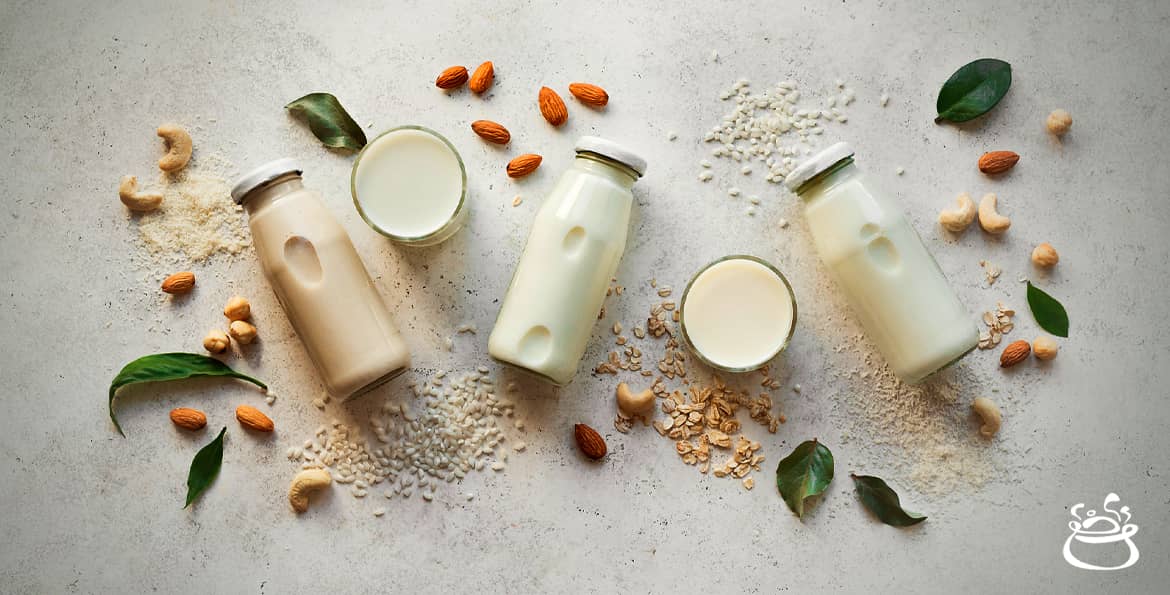The New Wave of Eco-Friendly Plant-Based Milk
The new wave of eco-friendly plant-based milk is changing how we think about dairy products. In recent years, plant-based milk has become mainstream and is quickly becoming one of the most popular alternatives to cow’s milk. With its eco-friendly production process and numerous health benefits, plant-based milk is an excellent option if you are looking to cut down on your dairy consumption or reduce your environmental footprint.
This blog will explore plant-based milk, its various benefits, popular types available today, potential disadvantages when switching to plant-based milk alternatives, and some tips for the transition. Read on to find out more.
About Plant-Based Milk
Plant-based milk is a non-dairy substitute that typically comes from plants such as soybeans, oats, nuts, or seeds. It is created by soaking these ingredients in water and blending them until a creamy liquid resembling traditional cow’s milk forms.
You can flavor the mixture with natural additives such as vanilla extract or cocoa powder. You can also enrich it with vitamins and minerals like calcium or Vitamin D to make it a healthier alternative to regular cow’s milk.
Additionally, since plant-based milk production doesn’t involve animals, it requires fewer resources and fewer emissions than regular cow’s milk, making it an eco-friendly choice.
Benefits of Plant-Based Milk
Plant-based milk are naturally cholesterol-free, making them an excellent choice for those trying to reduce their intake of animal fats while still getting essential nutrients found in traditional dairy products.
Additionally, they typically contain more healthy fats than regular cows’ milk, which can help promote weight loss when consumed in moderation alongside a balanced diet. Plant-based milk is fortified with calcium to make them as nutrient-dense as regular cows’ milk but without all the unhealthy saturated fats. Finally, most plant-based milk also contain added vitamins like vitamin A and B12, which helps offset any deficiencies caused by cutting out dairy from your diet.
Popular Plant-Based Milks
Soymilk: Soymilk has been one of the most popular plant-based milk since its inception in Japan over 100 years ago. It is known for being high in protein content (which can help build muscle) and containing high amounts of calcium and other essential nutrients like iron and magnesium, which help keep bones strong and healthy. Soymilk also contains lignans – an antioxidant believed to protect against some cancers – making it an especially beneficial choice if you are looking for a nutritious alternative to traditional cow’s milk.
Almond Milk: A newer addition to the family of non-dairy milk, almond milk has become increasingly popular due to its mild flavor that makes it suitable for sweet and savory dishes.
Almond milk contains significantly fewer calories than regular cow’s milk while providing adequate protein, making it an excellent low-calorie option for those watching their weight without sacrificing nutrition quality.
Furthermore, almond milk also contains high levels of Vitamin E and Omega fatty acids – both compounds thought to protect against cardiovascular disease when enjoyed regularly alongside a balanced diet.
Hemp Milk: Hemp Milk may sound unfamiliar, but don’t let that stop you from trying this superfood drink. Hemp Milk derived from hemp seeds has been gaining popularity due to their high nutritional value, especially considering hemp’s impressive ratio between Omega 3 & 6 fatty acids.
Hemp Milk offers good levels of essential minerals like magnesium, zinc & phosphorous and provides anti-inflammatory properties due to its balance between Omega 3 & 6 fatty acids, making it an ideal choice if you’re looking for something different yet delicious.
Disadvantages Of Plant-Based Milk
One potential drawback associated with switching to consuming more plant-based milk instead of regular cows’ milk lies within taste preferences; people who have grown accustomed to drinking full-fat animal-based products often find adjusting difficult due to the lack of flavor variety offered by some brands.
Additionally, some of you may experience digestive discomfort upon transitioning overdue body not being used to digesting certain ingredients in these new products.
Another disadvantage lies in price differences between animal & vegan versions of dairy products; sometimes, vegan versions cost significantly more & may not fit into budget restrictions.
Lastly, though many vegan substitutes are fortified with enhanced minerals & vitamins, there is still concern about certain nutrients lacking if eliminating all animal-related ingredients, thus creating potential deficiencies that need addressing through other means.
Tips For Switching to Plant-Based Milk
Going dairy-free is a healthy and sustainable dietary choice; you don’t have to miss out on your favorite creamy drinks. Switching to plant-based milk can help reduce your environmental impact while giving you the calcium and vitamins your body needs. Here are six tips for making a successful transition to plant-based milk.
- Research types of plant-based milk available. There are many kinds: soy, almond, coconut, hemp, macadamia, cashew, and pea protein.
- Look for ways to reduce packaging waste, such as buying cartons of dairy-free milk instead of individual bottles or using a reusable container to buy in bulk.
- Compare brands like oat or rice milk with almond or coconut milk – they all have different flavors, so you’ll want to discover what tastes best for you.
- Slowly introduce plant-based milk one drink or meal at a time rather than replacing all dairy immediately, as it can be overwhelming and decrease success rates.
- Experiment with flavor combinations until you find something that works well; adding spices such as cinnamon or nutmeg can make many.
- Lastly, consider using the non-dairy alternative for baking and cooking; you can find some sweet treats in vegan shops that you will enjoy.
Conclusion
Plant-based milk is a popular product for vegans with dairy sensitivities, especially those concerned about sustainability since plant-based milk products often use fewer natural resources and have lower environmental impacts than dairy milk.
However, while plant-based milk have various advantages, such as being cholesterol-free and better for gut health due to their prebiotic content, they also have some nutritional drawbacks as compared to dairy milk.
Further research must be conducted to determine the best recommendation for choosing plant-based milk, as it can vary from person to person depending on their diets and lifestyles.
In conclusion, plant-based milk are an increasingly popular alternative to dairy milk which yields numerous advantages for consumers and the environment but should also be carefully evaluated before deciding.



 Settings
Settings
 Gift Card
Gift Card Blog
Blog Locate Us
Locate Us










 Home
Home
 Chefs
Chefs
 Chats
Chats
 My Order
My Order



